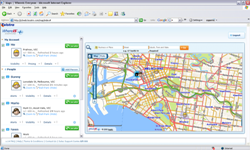Telstra mobile users get police powers

Telstra customers will receive the same service telco companies have been providing the law authorities for years — the ability to track people's location by their mobile phone.
The new service, called Whereis Everyone, allows users to request a friend's and family's location on a map. It only works, however, on Telstra mobiles.
Users register for the service, either on their phone or online at http://everyone.whereis.com. Once signed up, they nominate friends or family, who are then sent an invitation. If the invite is accepted, the user can request to see their location on a map, either online or using their phone.

Looking at the location of a mobile on a map
(Credit: Telstra)
The service has been designed for parents, who, for example, might want to know if their children have gone home after school. However, it could be used for other applications like surfies to see which beach their mates have landed at. Or it could be used by people who lose their phone.
Users can manually request someone's location, or create location alerts for certain times via SMS or email. The tracked friends do not get a notification when their location is requested.
Jonathan Oxer, founder of Internet Vision Technologies and previous president of Linux Australia, sees some potential use in the enterprise.
"That process could be used by companies who want to keep track of sales reps," he said, although acknowledged that there were alternative systems already in use.
Socially, he thinks a system that worked more as a proximity alarm would be better, alerting the user when friends came within a few metres so they could meet for coffee.
According to the Telstra spokesperson, this has been something the team has thought about, but which can only come into play when more mobile devices have assisted GPS. Whereis Everyone works on any phone, but offers accuracy of around 50m for phones with assisted GPS. Other phones can only be located using information from base stations — the accuracy can range from a few hundred metres in urban areas to a few kilometres in rural areas.
With this level of accuracy, it would be difficult to set up a proximity alert service. "At the moment when you're in the city then 300 to 500m covers a large amount of people," the spokesperson said.
Privacy wise, Telstra believes it has covered its bases by making the service opt in. Users can sign off the register at any time. If they don't want to be tracked by someone in particular, they can block them. If they don't want to be tracked for a while, they can specify an amount of time to go "invisible", where the service is made inactive.
"I'm not convinced that would put anyone's mind at rest if they went to track their wife and they were invisible," a spokesperson joked.
Every two weeks a reminder is sent to remind users who they have allowed to locate them, to make sure no one used their phone to accept the tracking permission on their behalf, for example by sending an invitation to a spouse's phone and using their phone to accept.
As for the location information in general, telcos have always had access to it. "Nothing changes from our end. It's just creating a user service that's been available to authorities for a number of years," the spokesperson said.
Whereis Everyone is free to join. Users pay 50 cents for each location look-up or can subscribe for AU$2.95 per month and receive unlimited look-ups. Preset location alerts cost 30 cents.